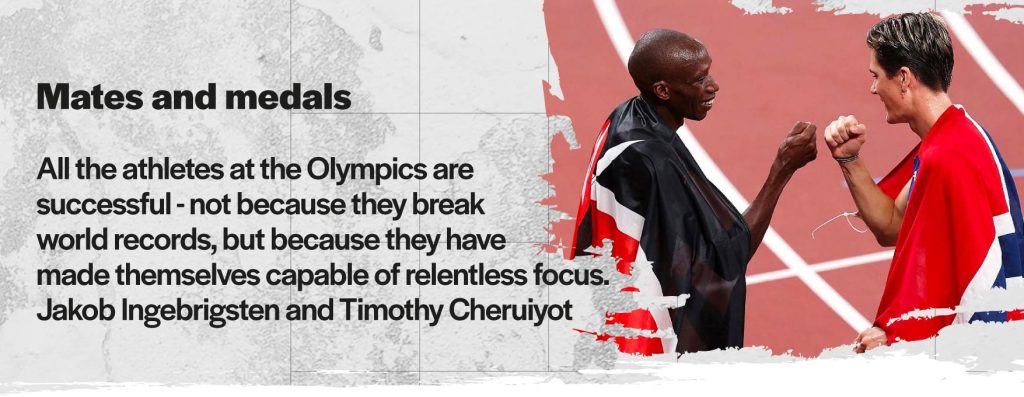The 2020 Olympics – these super humans have endured the hardest training sessions, made the ultimate sacrifices, and gone through dizzying highs and lows. A lot more people will place 10th or 20th than on the podium. Some had to pull out weeks before because of injury. How do you know if this huge career or lifestyle gamble will pay off? Are all Olympic athletes successful?
As a pro basketball player before a serious injury forced me to retire, I can say from experience that sports is a bet which always pays off!
Aiming high

One winner?
Our love of sports is there since childhood. Be it running around the block with a ball, taking a bicycle or scooter to the park, or karate classes, cricket matches, break dancing – we simply cannot stop moving at a young age. It’s like an atomic battery, needing to release energy before it explodes*. Movement is life, it develops us and defines us.
In our teens some drop that sporty vibe while some decide to structure their efforts towards a more specific goal, a “golden” sport of our dreams. That’s when we start to really aim high; we don’t want to just play the sport, we want to be good, great, excellent at it.** Those kids are lining themselves up for a lot of sacrifices!
The onion of sports
Skipping classes at school, cutting down on your social life, a strict diet, stress, loss of sleep, being constantly tired…*** These are only some hardships endured to try to get to the top. And yes, the key word here is “try”. That’s simultaneously the greatest fear and the greatest motivation of an aspirant athlete. Only a very small number will make it to the top. It’s like a big onion, plenty of layers but only the kernel is the part that eventually grows into a plant. Grit but not enough talent, you are peeled. Talent, but not enough dedication, you are peeled. Dedication, but no appropriate physique, you are peeled. Even wealth, in the 21st century (unfortunately) still remains a “peeling” factor!**** Add a pinch of luck, such as being in the right place at the right time, and you can see how scarce possibilities are.
Are you going to be a layer or a kernel?
What sport really is about
My verdict is that it doesn’t matter whether you will reach that top level or not. Sport forms us through different means. Adolescents who engage in regular medium/high level of sport tend to have better marks at school. *****They also better understand the importance of discipline, positively reflecting on their behaviour during high school and afterwards.****** And that’s before the obvious health benefits of sport for children, adolescents and adults (see my blog post on lifetime gains from puberty training). I myself came very close to the top, really really close. But my luck ended with a serious shoulder injury and I probably wouldn’t have been tall enough to be a top level basketball player. I am not going to lie, it felt terrible at the time, but life goes on. So, although I wasn’t successful in sport, sport made me successful. Sports gave me the ability to engage in very complicated tasks with a methodical approach. Thanks to sports, I am never afraid of how hard my next challenge is, because if there is a game, there is a strategy to win.

My biggest takeaway from sports: If there is a game, there is a strategy to win
And although not all games can be won, this is the greatest lesson of sport: you will never win if you don’t learn how to lose.
So yes, all the athletes, coaches and supporting staff at the Olympics are successful – not because they break world records, but because they have made themselves capable of relentless focus on what they like, and will remain an example that many will continue to follow.
Bring on the Olympics!
References
*Lloyd, S. R, Oliver, L. J. (2019) Strength and Conditioning for young athletes: science and applications. London: Routledge.
**Yukhymenko, M. (2014) ‘Students and athletes? Develompment of the academic and athletic identity scale (AAIS).’ Journal of sport, exercise and performance pschology 3(2), 89-101.
***Blum, D. (2020) Sports, Study, or Sleep. 1st edition. Los Angeles: Palgrave Macmillan
****Andrade-Rosas L. A., Fiegi M. (2019) ‘Quantitative and qualitative impact of GDP on sport performance and relation with corruption and other social factors.’ Revista de ciencias sociales y humanidades, 15-37.
*****Trudeau F., Shephard R. J. (2008) ‘Physical education, school physical activity school sports and academic performance.’ International Journal of behavioural nutrition and physical activity, 5(10), 1-12.
******Sutarman S., Ahmaddlen I. (2021)’The effect of education, discipline and performance on job satisfaction at the company.’ International journal of psychosocial rehabilitation, 1891 -1903.
Further reading
Cross, J. L., Fouke B. W. (2019) ‘Redefining the scholar-athlete.’ Frontiers i sports and active living, 1(10), 1-9.
Rees D. I., Sabia J. J. (2009) ‘Sports participation and academic performance: evidence from the national longitudinal study of adolescent health.’ Economics of education review, 29, 751-759.





